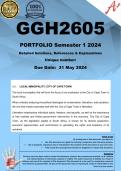GGH2605
PORTFOLIO Semester 1 2024
Detailed Solutions, References & Explanations
Unique number:
Due Date: 31 May 2024
1.1. LOCAL MINICIPALITY: CITY OF CAPE TOWN
The local municipality that will form the focus of my evaluation is the City of Cape Town in
South Africa.
When critically analyzing the political ideologies of conservatism, liberalism, and socialism,
the one that mostly resonates well with the City of Cape Town is liberalism.
Liberalism emphasizes individual rights, freedom, and equality, as well as the importance
of free markets and limited government intervention in the economy. The City of Cape
Town, as the legislative capital of South Africa, is known for its diverse population,
economic opportunities, and commitment to upholding the rights and freedoms of its
residents.
Terms of use
By making use of this document you agree to:
• Use this document as a guide for learning, comparison and reference purpose,
• Not to duplicate, reproduce and/or misrepresent the contents of this document as your own work,
• Fully accept the consequences should you plagiarise or misuse this document.
Disclaimer
Extreme care has been used to create this document, however the contents are provided “as is” without
any representations or warranties, express or implied. The author assumes no liability as a result of
reliance and use of the contents of this document. This document is to be used for comparison, research
and reference purposes ONLY. No part of this document may be reproduced, resold or transmitted in any
form or by any means.
, +27 67 171 1739
1.1. LOCAL MINICIPALITY: CITY OF CAPE TOWN
The local municipality that will form the focus of my evaluation is the City of Cape Town
in South Africa.
When critically analyzing the political ideologies of conservatism, liberalism, and
socialism, the one that mostly resonates well with the City of Cape Town is liberalism.
Liberalism emphasizes individual rights, freedom, and equality, as well as the
importance of free markets and limited government intervention in the economy. The
City of Cape Town, as the legislative capital of South Africa, is known for its diverse
population, economic opportunities, and commitment to upholding the rights and
freedoms of its residents.
The City of Cape Town has a strong emphasis on individual rights and freedoms, as
evidenced by its progressive policies and programs aimed at addressing social
inequality, promoting diversity, and protecting the rights of all citizens. This is in line
with the liberal ideology, which places a high value on individual liberties and rights.
Furthermore, the City of Cape Town has a strong focus on free markets and limited
government intervention in the economy. It is a hub for business and innovation, with
a thriving entrepreneurial spirit and a commitment to creating a competitive and open
market for trade and investment. This aligns with the liberal belief in the power of free
markets to drive economic growth and prosperity.
In addition, the City of Cape Town has been proactive in pursuing environmentally
sustainable policies and practices, reflecting the liberal ideology's emphasis on the
importance of protecting the environment and natural resources for future generations.
Overall, the liberal ideology resonates well with the City of Cape Town's commitment
to individual rights, free markets, and environmental sustainability. While elements of
conservatism and socialism can also be identified within the municipality's policies and
programs, it is the liberal ideology that most closely aligns with the values and priorities
of the City of Cape Town.
In conclusion, the City of Cape Town's focus on individual rights, free markets, and
environmental sustainability reflects a strong resonance with the liberal ideology. This
Disclaimer
Extreme care has been used to create this document, however the contents are provided “as is” without
any representations or warranties, express or implied. The author assumes no liability as a result of
reliance and use of the contents of this document. This document is to be used for comparison, research
and reference purposes ONLY. No part of this document may be reproduced, resold or transmitted in any
form or by any means.




